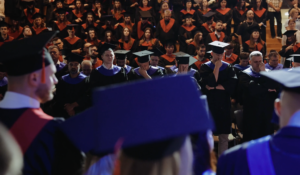
FORT WORTH, Texas (BP)–Newborn baby Hope was just fine. Big sister Molly now had a perfect match for her bone marrow transplant. Rachel and Jake had not planned on a second baby, but the need for an exact genetic match had demanded the birth of Molly’s cloned, twin sister.
The genetic frontiers are daily expanding; human cloning, while not yet possible, may soon be among the reproductive choices available.
Some greet this possibility with enthusiasm. Others fear a drastic change in how humans proceed from one generation to the next. For people of faith, who look to an ancient wisdom, that look at least signals caution. The creation narratives of the Bible call humanity to exercise some measure of control over God’s creation — not in any way we please, but as agents of God’s good intentions for the cosmos.
The early chapters of Genesis, however, also warn of the serpent’s voice, whose offer is always the same: “You can break the limits of your human finitude and leave behind your status as a creature. You can possess a wisdom that will make you like God.”
What would human cloning represent? An exercise of responsibility by those who act as God’s agents? Or a falling prey to the tempter’s snare?
Some of the arguments against human cloning can be dismissed. “Human cloning threatens individual dignity and identity!” That would only be the case if our dignity and identity were entirely the result of our genetic makeup. Such a genetic reductionism, however, differs from a faith perspective that says who we are has as much to do with the interplay between our spirit and the Spirit of God as it does our DNA.
“Human cloning enables the fabrication of an underclass of humans designed only with menial tasks in mind!” This outlook repeats the fallacy of genetic reductionism that believes our genes fully determine our destiny. At any rate, prospects for cloning are only of recent vintage; humanity has practiced the subjugation of others for millennia — we need no advanced technology for that.
There are, however, more substantial arguments that derive from a basic respect for human life and the recognition of the limits of human wisdom.
Dolly the sheep was fashioned only after 276 failed attempts, which meant plenty of discarded embryos along the way. For many of us, the potential benefits of cloning do not take priority over the further devaluing of human life that the experimental processes required would exhibit.
Further, the law of unintended consequences demands of us careful consideration before the implementation of new technologies. This is clearly the case when dealing with reproductive technologies. Human cloning is a means of asexual reproduction. Do we know what would be the familial and social consequences of the unprecedented departure from what, throughout human history, has always been the case concerning human reproduction — that it takes both a father and a mother to conceive a child?
Family fragility is already too much with us. Are we prepared for yet another assault on an already weakened institution?
Why clone humans? Matters of precision and control, protection against the uncertainties that come with trusting in providence, concern for quality and durability. Of course, some of these same concerns are present in many manufacturing processes. Certainly a manufacturer of memory chips must guarantee computer makers standardized parts for their trade. But the wonder and gift of life is not the same as a lap-top.
Demands for precision and control turn life more into a commodity to be possessed and used than a gift to be received and treasured. Besides, the illusion of such absolute control over human destiny is itself simply one more echo of the tempter’s voice.
Representing God in God’s creation has never rightly included diminishment of the giftedness of life. As beneficial as cloning might be, cloning humans might end up threatening the very goodness of life we would seek to protect.
Cloning Dolly is one thing. Cloning Molly is another.
–30–
Holloway is associate professor of Christian ethics at Southwestern Baptist Theological Seminary, Fort Worth, Texas.














